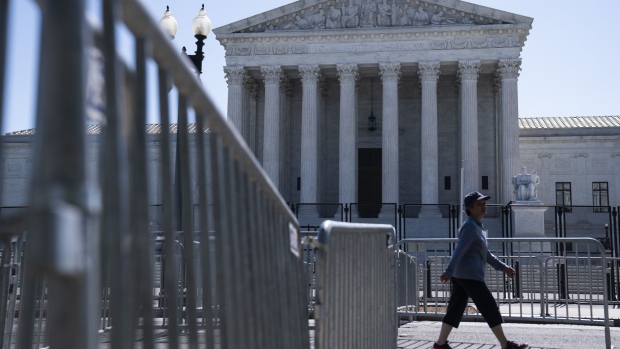May 13, 2022
Tech Advocates Ask Supreme Court to Block Texas Social Media Law
, Bloomberg News

(Bloomberg) -- Tech groups representing Facebook and Google said they asked the US Supreme Court to block a Texas law that social media firms say will prevent them from removing hate speech and extremism from their platforms.
The emergency filing Friday comes two days after a divided federal appeals court let the law take effect while a legal challenge filed by the tech groups goes forward. The New Orleans-based 5th US Circuit Court of Appeals’ order, which came without explanation, put on hold a temporary injunction a trial judge issued in December.
The industry groups, NetChoice and the Computer and Communication Industry Association, represent companies including Twitter Inc., Facebook parent Meta Platforms Inc. and Google parent Alphabet Inc.
“The divided panel’s shocking decision to greenlight an unconstitutional law-- without explanation -- demanded the extraordinary response of seeking emergency Supreme Court intervention,” Chris Marchese, Counsel for NetChoice, said in a press release, announcing the filing.
The trade groups claim the law, known as HB 20, would force platforms to host extremist content in violation of their user policies and their First Amendment rights. Platforms with more than 50 million users, like Twitter and Facebook, fall under the law’s criteria.
The law “is an assault on the First Amendment -- and we remain confident the courts will strike it down as unconstitutional,” NetChoice general counsel Carl Szabo said in a statement.
“This unexplained order contravenes established First Amendment law,” CCIA President Matt Schruers said in a statement. “No option is off the table. We will do what is necessary to ensure that the free market, not government fiat, decides what speech digital services do and do not disseminate.”
Texas Governor Greg Abbott and other Republicans argue the law is needed to protect conservative viewpoints from being silenced.
US District Judge Robert Pitman in Austin issued a preliminary injunction barring enforcement of key provisions of the law while the pair of trade groups proceeded with their lawsuit. The judge, a Barack Obama appointee, determined the groups are likely to succeed on their claim that social media platforms have a First Amendment right to moderate content.
The lower court rejected the state’s argument that platforms don’t get such protections because they’re not newspapers and that artificial intelligence is sometimes used to make moderating decisions. Pitman said in his December ruling that the editorial discretion at social media platform doesn’t “fit neatly with our 20th Century vision of a newspaper editor hand-selecting an article to publish.”
“It is indeed new, and exciting -- or frightening, depending on who you ask -- that algorithms do some of the work that a newspaper publisher previously did, but the core question is still whether a private company exercises editorial discretion over the dissemination of content, not the exact process used,” Pitman wrote.
The Supreme Court has a scant track record on cases involving social media and content moderation, although Justice Clarence Thomas suggested last year that the government might constitutionally be able to limit Twitter’s ability to ban users.
A different federal appeals court, the Atlanta-based 11th US Circuit Court of Appeals, is considering a similar Florida law.
The case is NetChoice v. Paxton, 21-51178, 5th US Circuit Court of Appeals (New Orleans).
©2022 Bloomberg L.P.





